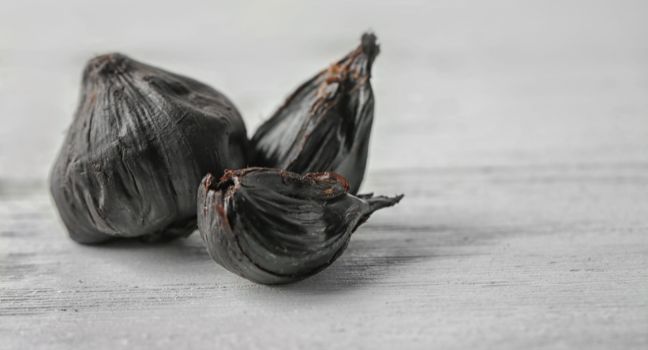10.09.23
A new clinical study found that an aged black garlic extract marketed by Pharmactive Biotech Products as ABG10+ had a positive effect in blood pressure, among a group of patients exhibiting stage-one hypertension already receiving drug treatment.
Aged black garlic is a type of garlic aged under controlled temperatures, which potentiates the accumulation of garlic’s complex of bioactive, antioxidant compounds, which include polyphenols, flavonoids, and melanoidins, including S-allyl cysteine (SAC).
The study, published in Nutrients, was a randomized, triple-blind controlled trial conducted at the Hospital Universitari Arnau de Vilanova in Spain, in collaboration with the Atherothrombotic Disease Detection and Treatment Unit.
The study involved a total of 81 volunteers with stage-one hypertension, who were already on medication to reduce their blood pressure.
Over 12 weeks, subjects received 250 mg of ABG10+ daily, which provided a dose of 0.25 mg of SAC, or a placebo. The patients were instructed not to change diet or lifestyle, and to continue taking their blood pressure medication. Measurements were recorded daily at home by the participants, and also by specialists at baseline and at the end of the study.
ABG10+ was linked to better control over blood pressure levels, with reductions averaging 1.8 mmHg systolic and 1.5 mmHg diastolic pressure. Blood serum tests revealed that supplementation may have boosted the release of nitric oxide and increased the body’s antioxidant capacity. ACE activity seemed to be reduced, and lower blood uric acid levels were also observed.
“These secondary parameters help us gain an understanding of the likely mechanism behind ABG10+’s effect on blood pressure,” said Alberto Espinel, open innovation director of Pharmactive. “Nitric oxide is a natural vasorelaxant produced in the body to maintain cardiovascular function, improving blood pressure, and increasing blood flow. Nitric oxide also is a cellular antioxidant and thus helps mitigate oxidative stress and its associated negative effects on blood vessels and the cardiovascular system. Reducing the angiotensin converting enzyme activity is a key strategy to decrease blood pressure in hypertensive patients.”
The majority of volunteers had a history of high blood pressure spanning an average of 15 years. Despite adhering to their drug therapy, they were still unable to maintain blood pressure levels within the normal range.
“This study suggests that incorporating food bioactives such as aged black garlic extract into the treatment regimen could serve as. Valuable complement to conventional drug therapy, and could contribute to reduced cardiovascular risk,” said Espinel. “Such intervention could be especially beneficial for the management of arterial high blood pressure in persons experiencing resistance to drug therapy, all without inducing side effects.”
The new study followed favorable outcomes of a 2022 clinical trial, in which participants with moderately elevated cholesterol levels achieved significant reduction in diastolic blood pressure by an average of 5.85 mmHg, compared to placebo.
Aged black garlic is a type of garlic aged under controlled temperatures, which potentiates the accumulation of garlic’s complex of bioactive, antioxidant compounds, which include polyphenols, flavonoids, and melanoidins, including S-allyl cysteine (SAC).
The study, published in Nutrients, was a randomized, triple-blind controlled trial conducted at the Hospital Universitari Arnau de Vilanova in Spain, in collaboration with the Atherothrombotic Disease Detection and Treatment Unit.
The study involved a total of 81 volunteers with stage-one hypertension, who were already on medication to reduce their blood pressure.
Over 12 weeks, subjects received 250 mg of ABG10+ daily, which provided a dose of 0.25 mg of SAC, or a placebo. The patients were instructed not to change diet or lifestyle, and to continue taking their blood pressure medication. Measurements were recorded daily at home by the participants, and also by specialists at baseline and at the end of the study.
ABG10+ was linked to better control over blood pressure levels, with reductions averaging 1.8 mmHg systolic and 1.5 mmHg diastolic pressure. Blood serum tests revealed that supplementation may have boosted the release of nitric oxide and increased the body’s antioxidant capacity. ACE activity seemed to be reduced, and lower blood uric acid levels were also observed.
“These secondary parameters help us gain an understanding of the likely mechanism behind ABG10+’s effect on blood pressure,” said Alberto Espinel, open innovation director of Pharmactive. “Nitric oxide is a natural vasorelaxant produced in the body to maintain cardiovascular function, improving blood pressure, and increasing blood flow. Nitric oxide also is a cellular antioxidant and thus helps mitigate oxidative stress and its associated negative effects on blood vessels and the cardiovascular system. Reducing the angiotensin converting enzyme activity is a key strategy to decrease blood pressure in hypertensive patients.”
The majority of volunteers had a history of high blood pressure spanning an average of 15 years. Despite adhering to their drug therapy, they were still unable to maintain blood pressure levels within the normal range.
“This study suggests that incorporating food bioactives such as aged black garlic extract into the treatment regimen could serve as. Valuable complement to conventional drug therapy, and could contribute to reduced cardiovascular risk,” said Espinel. “Such intervention could be especially beneficial for the management of arterial high blood pressure in persons experiencing resistance to drug therapy, all without inducing side effects.”
The new study followed favorable outcomes of a 2022 clinical trial, in which participants with moderately elevated cholesterol levels achieved significant reduction in diastolic blood pressure by an average of 5.85 mmHg, compared to placebo.




























